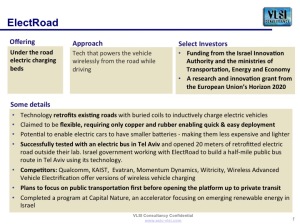Continuing on my earlier posts on a few interesting data sets on some select startups (and scale ups) in the autonomous driving eco-system………….
Mostly when we think about electric vehicles, we gear towards smart and efficient batteries, high charge storage, long lasting (longer range), quick charging, scalable charging infrastructure etc. Roads that these vehicles tread on, are however quite often overlooked.
ElectRoad is a wireless vehicle charging startup from Israel that has come up with a cost effective greener way of travel using electromagnetic induction technology. Wireless energy charging strips are laid into 8 cm deep trenches dug into roads. Smart real time communication converters installed on the road sides link it up to the city’s electric grid. Power gets transferred from the energy charging strips in the roads to the electric vehicle via a coil unit attached beneath it.
Dynamic Electric Vehicle Charging (DEVC) which allows vehicles to charge while driving is not new with Qualcomm, Korea Advanced Institute of Science and Technology (KAIST), Evatran, Witricity, Momentum Dynamics as some of the other players in this space.
The implementation and subsequent adoption requires a buy-in from the public infrastructure entities. So it is but natural and practical for ElectRoad to have its initial focus on public transportation. It plans to work its way up from there to taxis and eventually to private vehicles. The startup is working with relevant stakeholders in Israel: Israel Electric Company, Transportation Ministry, municipal authorities (Tel Aviv & Haifa), Infrastructure Company. Tel Aviv with its investments made in electric buses for public transportation was selected for pilot trials. It received funding in October 2015 from the European Union’s €18 billion Horizon 2020 project and plans to apply for Phase 2 Horizon 2020 grants end of this year. Having already set up partnerships in Europe, it expects to start a pilot project modeled on the Tel Aviv one in a European city in 2018.
Talking about European market, Qualcomm demonstrated its Halo Wireless Electric Vehicle Charging (WEVC) at the 100 m FABRIC test track built by VEDECOM in Satory Versailles using Renault vehicles. FABRIC is a €9 million project funded by European Commission for DEVC as EV range extension and includes a consortium of 25 organizations panning 9 European nations.
Below is the ElectRoad snippet from my brief:
Look out for the last of my 5 posts series on this topic next week.
